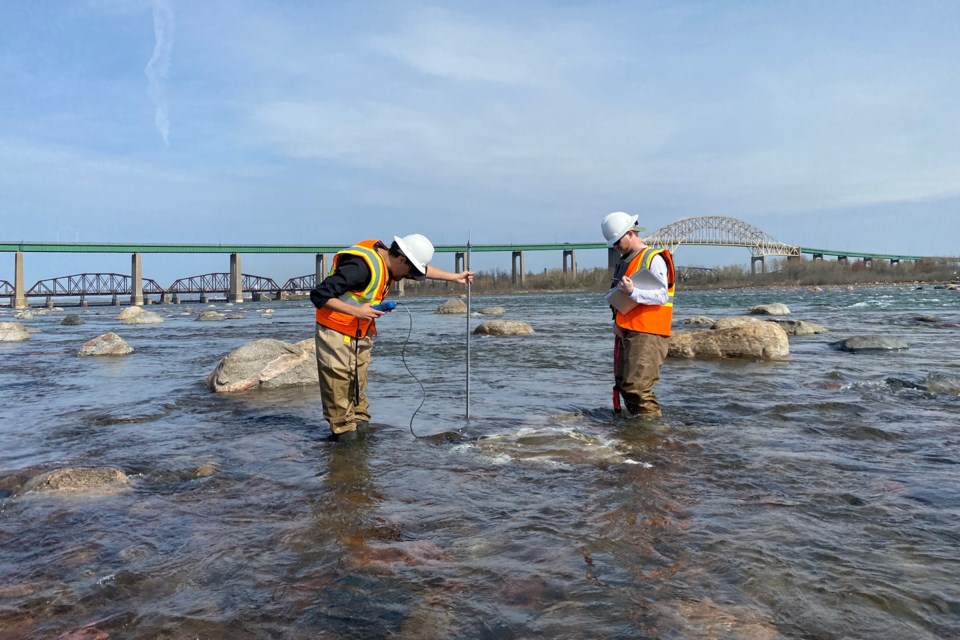A cross-border collaboration between stakeholders on both sides of the St. Marys River aims to further protect the Great Lakes by bolstering research into oil spills and their impacts upon freshwater environments.
Earlier this year, Lake Superior State University (LSSU) obtained $3.87 million in funding from the Government of Canada to establish the International Consortium of Oil Research - Our Waters of the North between partners in both Canada and the United States, with the goal of advancing scientific knowledge and developing innovative oil spill response technologies.
The collaborative effort brings together 12 organizations and 24 scientists from both sides of the border, with the Center for Freshwater Research and Education at LSSU and Algoma University as lead partners for the consortium.
“Within just a matter of a few years, we’ve now started to build enhanced capacity in both the U.S. and Canada to start addressing this issue,” said Dr. Ashley Moerke, Dean of the College of Great Lakes Ecology and Education at LSSU and the school’s lead of the International Collaboration on Oil Research. “Normally, government funding and programs don’t move that quickly, so it’s exciting to see how fast this has really developed.”
Much of the research that will be done by the consortium revolves around trying to improve the science that will inform the response to oil spills in the Great Lakes and preparing for them, Moerke said. The international consortium allows researchers on both sides of the border to partner in terms of resources and expertise, and to bring and build resources in the Great Lakes in an effort to be better prepared for oil spills in the future.
“We’re really trying to build the capacity to do better science in this region — science that relates to what’s in our backyard in these kinds of cold climate freshwater conditions, which is different than the past science, which has really emphasized marine environments,” Moerke said.
Three key research projects will be undertaken by the consortium:
Research on Oil Fate in Freshwater Ecosystems: In partnership with the US Geological Survey, Memorial University, and the US Coast Guard, this project focuses on understanding the behavior and transport of oil, particularly diluted bitumen, in freshwater ecosystems.
Oil Spill Detection and Monitoring Technologies: Collaborating with Algoma University, University of Windsor, National Oceanic and Atmospheric Administration, Limnotech and the University of Michigan, this project aims to develop advanced technologies for detecting and monitoring oil spills in freshwater and ice environments, including innovative drone and autonomous underwater vehicle systems.
Ecological Effects of Oil Spills in Cold-Climate Ecosystems: In partnership with Algoma University and the University of Windsor, this research examines the ecological impacts of oil spills and bioremediation strategies in the cold-climate coastal wetlands of the Laurentian Great Lakes.
Moerke is excited about the key research projects, given the emphasis that will be placed on training students and scientists in the early stages of their careers in order to create the next generation of scientists in order to build capacity around the Great Lakes.
“It really is looking at many different components of these questions, which is why it’s become such a big project that is really going to involve and engage a lot of experts within this field,” she said.
The international consortium is being ushered in as Algoma Steel faces environmental charges in relation to an oil spill — potentially two, according to the Ministry of the Environment — that took place in June 2022.
As previously reported by SooToday, a spill on the St. Marys River occurred June 9, 2022, prompting Algoma Public Health to issue a public advisory warning residents downstream from the plant not to consume, swim or bathe in water drawn from the St. Marys River. The advisory also warned that the river should not be used for recreational purposes, such as kayaking and fishing.
While the U.S. Coast Guard reported that more than 20,000 litres of oil entered the St. Marys River, an arbitration hearing involving the Sault steelmaker and information from the ministry both suggested that only a "small quantity" of oil actually made its way into the waterway.
Although Enbridge's Line 5 crude oil pipeline garners much attention when it comes to potential threats of an oil spill in the Great Lakes, Moerke said there are also concerns about spills such as the June 9, 2022 spill in the St. Marys River and the potential for grounding of freighters that could result in a spill.
“It’s a bigger question to make sure to make sure that we have the best science that guides how we respond to those issues,” she said. “I think the fact that we’re now leveraging U.S. and Canadian resources means that we should be able to move relatively quickly to be able to address those questions, and hopefully implement or operationalize best response methods.”
Earlier this month, the U.S. Coast Guard Great Lakes Center of Expertise, hosted at LSSU’s Center for Freshwater Research and Education, was formally commissioned by the coast guard — a ceremony usually reserved for its ships — and will help further expand the capacity of the consortium going forward.
“It just emphasizes what the role is of the center for expertise, and how it is valued by the coast guard and the federal government in this mission of trying to increase our preparedness and response to oil spills in freshwater environments,” Moerke said.
- with files from Kenneth Armstrong
